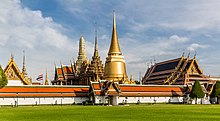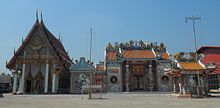
Back الدين في تايلاند Arabic Tailandda din Azerbaijani دین در تایلند Persian Religion en Thaïlande French थाईलैंड में धर्म Hindi Agama di Thailand ID Religioni in Thailandia Italian რელიგია ტაილანდში Georgian សាសនាក្នុងប្រទេសថៃ Cambodian थायलंडमधील धर्म Marathi




Buddhism is the predominant religion in Thailand. It is practised by between roughly 90[1] and 94%[2] of the total population and is deeply influenced by Hinduism. The Thai Constitution does not indicate any state religion, but promotes Buddhism, while guaranteeing religious freedom for all Thai citizens.
Many other people, especially among the Isan ethnic group, practise Tai folk religions. A significant minority Muslim population, mostly constituted by Thai Malays, is present especially in the southern regions. According to an Ipsos survey, Christians might be a similarly significant religious minority population (4%).[1] It's also reported that 1% prefer not to say and another 1% has no religion. Thai law officially recognizes five religions: Buddhism, Islam, Christianity, Hinduism, and Sikhism.[3]
- ^ a b c "Global Religion – Religious Beliefs Across the World" (PDF). Ipsos. May 2023. Archived (PDF) from the original on 12 May 2023. Retrieved 23 August 2023.
- ^ "Population by religion, region and area, 2018". NSO. Retrieved 9 March 2021.[dead link]
- ^ "US State Dept 2022 report".
Cite error: There are <ref group=lower-alpha> tags or {{efn}} templates on this page, but the references will not show without a {{reflist|group=lower-alpha}} template or {{notelist}} template (see the help page).